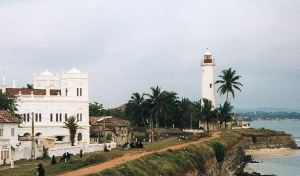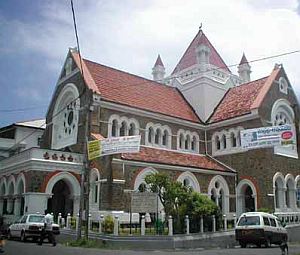 Galle
Galle
Galle (Pronounced as Goll) is a major city in Sri Lanka, situated on the southwestern tip of Sri Lanka, 119 km from Colombo. Galle is the administrative capital of Southern Province, Sri Lanka and the district capital of Galle District. Galle is the fifth largest city in the country, after the capital Colombo, Kandy, Jaffna and Negombo.
Galle was known as Gimhathiththa (although Ibn Batuta in the 14th century refers to it as Qali[1] before the arrival of the Portuguese in the 16th century, when it was the main port on the island. Galle reached the height of its development in the 18th century, during the Dutch colonial period. The major river in the area is the Gin River (Gin Ganga), which starts from Gongala Kanda and, passing villages such as Neluwa, Nagoda, Baddegama, Thelikada, and Wakwella, reaches the sea at Ginthota. The river is bridged at Wakwella by the Wakwella Bridge.
Galle is the best example of a fortified city built by the Portuguese in South and Southeast Asia, showing the interaction between Portuguese architectural styles and native traditions. The Galle fort is a world heritage site and the largest remaining fortress in Asia built by European occupiers. Other prominent landmarks in Galle include the city's natural harbor, the National Maritime Museum, St. Mary's Cathedral founded by Jesuit priests, one of the main Shiva temples on the island, and Amangalla the historic luxury hotel.
On 26 December 2004 the city was devastated by the massive Boxing Day Tsunami caused by the 2004 Indian Ocean earthquake that occurred a thousand miles away, off the coast of Indonesia. Thousands were killed in the city alone. Galle is home to a cricket ground, the Galle International Stadium, rebuilt after the tsunami. Test matches resumed there on December 18, 2007.
Rumassala in Unawatuna is a large mound-like hill, which forms the eastern protective barrier to the Galle harbour. Local tradition associates this hill with some events of the Ramayana.
Getting to Galle
Galle is served by Sri Lanka Railways' Coastal Line. Galle Railway Station is a major station on the line, and serves as the meeting point of the west-coast and south-coast segments of the line. Galle is connected by rail to Colombo and Matara.
The Southern Expressway, Sri Lanka's first E Class highway also links the Sri Lankan capital Colombo with Galle.
Hotels in Galle
 History
of Galle
History
of Galle
According to James Emerson Tennent, Galle was the ancient seaport of Tarshish, from which King Solomon drew ivory, peacocks and other valuables. Cinnamon was exported from Sri Lanka as early as 1400 BC and the root of the word itself is Hebrew, so Galle may have been a main entrepot for the spice.
Galle had been a prominent seaport long before western rule in the country. Persians, Arabs, Greeks, Romans, Malays, Indians, and Chinese were doing business through Galle port. In 1411, the Galle Trilingual Inscription, a stone tablet inscription in three languages, Chinese, Tamil and Persian, was erected in Galle to commemorate the second visit to Sri Lanka by the Chinese admiral Zheng He.
The "modern" history of Galle starts in 1505, when the first Portuguese ship, under Lourenço de Almeida was driven there by a storm. However, the people of the city refused to let the Portuguese enter it, so the Portuguese took it by force.
In 1640, the Portuguese had to surrender to the Dutch East India Company. The Dutch built the present Fort in the year 1663. They built a fortified wall, using solid granite, and built three bastions, known as "Sun", "Moon" and "Star". After the British took over the country from the Dutch in the year 1796, they preserved the Fort unchanged, and used it as the administrative centre of Galle.
Governance
The Galle Municipal Council governs the City of Galle, established under the Municipalities Ordinance of 1865. It was, at the time, only the 3rd municipal council in the country. The first mayor of the city was appointed in 1939 in the person of Wijeyananda Dahanayake, who later went on to become Prime Minister of Ceylon.
The current Mayor of Galle is Methsiri de Silva, appointed December 4, 2008. The main vision of Galle City is "Building of moderate city through the supply of relatively increased utility services to the citizens who pay taxes to the Galle Municipal Council ", and to brand Galle as "Green City-Green Galle" [3] to create and promote Galle as Sri Lanka's cool and healthy coastal city with a clean green canopy.
Climate
Galle features a tropical rainforest climate. The city has no true dry season, though it is noticeably drier in the months of January and February. As is commonplace with many cities with this type of climate, temperatures show little variation throughout the course of the year, with average temperatures hovering at around 26 degrees Celsius throughout

